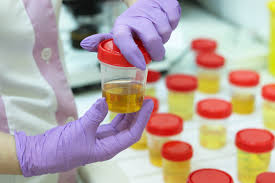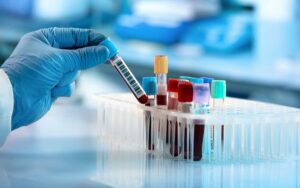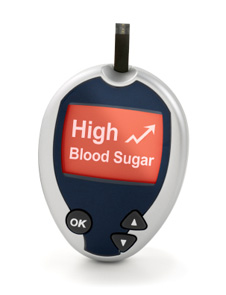If you have diabetes, it’s important to monitor your ketone levels. Ketones are chemicals that are produced when the body breaks down fat for energy. When there are high levels of ketones in the blood or urine, it means that the person has a condition called ketoacidosis. This can be a life-threatening emergency. In this blog post, we will discuss what trace ketones in urine mean, and how to properly monitor your ketone levels.
Contents
What Do You Mean By “Trace” Ketones?
 Ketones are produced when the body breaks down fat for energy. The body does this when it doesn’t have enough sugar (glucose) to burn for energy. This can happen if you skip meals, or if you have an illness that makes it hard to digest food. When there are high levels of ketones in the blood or urine, it means that the person has a condition called ketoacidosis.
Ketones are produced when the body breaks down fat for energy. The body does this when it doesn’t have enough sugar (glucose) to burn for energy. This can happen if you skip meals, or if you have an illness that makes it hard to digest food. When there are high levels of ketones in the blood or urine, it means that the person has a condition called ketoacidosis.
Ketoacidosis is a serious condition that can be life-threatening. If you have diabetes, it’s important to monitor your ketone levels. You can do this at home with a simple urine test. It’s important to talk to your doctor about what your results mean.
A “trace” result means that there are small amounts of ketones in your urine. This may be a sign that your blood sugar is starting to get too high. If you test positive for trace ketones, it’s important to check your blood sugar levels. If they are higher than normal, you should contact your doctor.
What Are The Normal Levels of Ketones?
Ketone levels can vary from person to person. The normal range is 0.0-0.24 mmol/L. A “trace” result is usually between 0.25 and 0.50 mmol/L. If your ketone levels are higher than this, it may be a sign that your blood sugar is getting too high. So it’s important to check your blood sugar levels if you test positive for trace ketones. It’s also important to contact your doctor if your ketone levels are high.
How To Monitor Your Ketone Levels?
If you have diabetes, it’s important to monitor your ketone levels. It gives you information about your blood sugar levels and how well your diabetes is controlled. There are two ways to test for ketones:
Urine tests
A urine test is done with a dipstick. If you have trace ketones in your urine, it means that your blood sugar is starting to get too high. In case you test positive for trace ketones, it’s important to check your blood sugar levels. If they are higher than normal, you should contact your doctor.
How is it done?
A urine test is done with a dipstick. You can buy these at the drugstore. To use it, you will need to:
- Collect a urine sample in a clean cup.
- Dip the strip into the urine.
- Wait for the strip to change color.
- Compare the color of the strip to the chart on the bottle.
Blood tests
 A blood test is done with a small needle. It measures the number of ketones in your blood. The interpretation of blood ketone results is similar to that of urine ketone results. Blood tests are considered to be more accurate than urine tests.
A blood test is done with a small needle. It measures the number of ketones in your blood. The interpretation of blood ketone results is similar to that of urine ketone results. Blood tests are considered to be more accurate than urine tests.
How is it done?
A blood test is done with a small needle. To use it, you will need to:
- Clean the area where the needle will go with an alcohol swab.
- Insert the needle into a vein.
- Collect the sample of blood.
- Send the sample to a lab for testing.
Other ways to test for ketones
There are other ways to test for ketones, but they are not as common. These include:
Ketone strips
Ketone strips are a quick and easy way to check your ketone levels. They are available at most pharmacies. To use them, you will need to collect a urine sample. Dip the strip into the urine and wait for the results. The strips will change color to show whether or not there are ketones in your urine. You can then compare the results to a chart that will tell you what your ketone level is.
Ketone meters
Ketone meters are another way to check your ketone levels. They are similar to blood glucose meters. To use them, you will need to prick your finger and collect a small drop of blood. You will then place the drop of blood on a test strip and insert it into the meter. The meter will give you a reading of your ketone level.
Ketone breathalyzers
Ketone breathalyzers are also available. They work by measuring the amount of acetone in your breath. To use them, you will need to breathe into the breathalyzer. The machine will then give you a reading of your ketone level. It’s important to follow the instructions that come with the breathalyzer.
These are some of the ways that you can test for ketones. It’s important to talk to your doctor about which method is best for you. No matter which method you use, it’s important to check your ketone levels if you have diabetes. It will help you to know if your blood sugar is getting too high.
When Should You Test For Ketones?
Test for trace ketones is important to check your ketone levels. This test is usually done with a urine sample. It’s important to talk to your doctor about when you should test for ketones. You should go for the test in case of the following conditions:
High blood sugar level
 Your healthcare provider will likely tell you to test for ketones when your blood sugar levels are higher than 240 mg/dL. This is because high blood sugar levels can be a sign that your body is breaking down fat for energy.
Your healthcare provider will likely tell you to test for ketones when your blood sugar levels are higher than 240 mg/dL. This is because high blood sugar levels can be a sign that your body is breaking down fat for energy.
Infection
You should also test for ketones if you have an infection. This is because infections can make it hard for your body to digest food. As a result, your body may break down fat for energy. This test will help to check if you have an infection.
Pregnancy
If you are pregnant, you should test for ketones. This is important because ketones can be harmful to your baby. That’s why it’s important to talk to your doctor about when you should test for ketones. The test should be performed by a healthcare professional.
These are the conditions under which you should test for ketones. If you have any of these conditions, it’s important to talk to your doctor about the best way to monitor your ketone levels.
What Should You Do If You Have High Ketone Levels?
If you have high ketone levels, it’s important to take action. This is because high ketone levels can be dangerous. If left untreated, high ketone levels can lead to diabetic ketoacidosis (DKA). Below are some steps you should take if you have high ketone levels:
Test your blood sugar levels
If you have high ketone levels, it’s important to test your blood sugar levels. This will help you to see if your blood sugar levels are also high. If they are, this is a sign that you may be developing DKA. You should contact your doctor if your blood sugar levels are high as it can be a sign that you need treatment.
Test your ketone levels again
If you have high ketone levels, it’s important to test your ketone levels again. This is because the first test may not have been accurate. Try to test your ketone levels using a different method. If you still have high ketone levels, this is a sign that you need treatment.
Stop exercising
If you have high ketone levels, it’s important to stop exercising. This is because exercise can make your ketone levels go even higher. If you can’t stop exercising, try to do moderate exercise instead of intense exercise. It will help to lower your ketone levels and reduce your risk of developing DKA.
Drink fluids
 If you have high ketone levels, it’s important to drink fluids. This will help to prevent dehydration. Dehydration can make DKA worse. It’s important to drink clear fluids like water or unsweetened juices. You should also avoid drinks with caffeine or alcohol.
If you have high ketone levels, it’s important to drink fluids. This will help to prevent dehydration. Dehydration can make DKA worse. It’s important to drink clear fluids like water or unsweetened juices. You should also avoid drinks with caffeine or alcohol.
Eat foods high in carbohydrates
Foods high in carbohydrates can help to raise your blood sugar levels. This will help to lower your ketone levels. Good sources of carbohydrates include fruits, vegetables, bread, and cereal. It’s important to eat these foods even if you don’t feel hungry.
Contact your healthcare provider
If you have high ketone levels, it’s important to contact your healthcare provider. This is because DKA can be a medical emergency. Your healthcare provider will give you instructions on what to do next. They may also tell you to go to the hospital.
Try to test for ketones if you have any of the conditions mentioned above. If you have high ketone levels, take action to lower them. Contact your healthcare provider if you have any questions or concerns. They will be able to give you more information on how to monitor your ketone levels.
Conclusion
So, there you have it! Everything you need to know about trace ketones in urine in diabetes. You should now have a better understanding of what they are, why they occur, and how to treat them. If you have any further questions, be sure to speak with your doctor or healthcare team.
Remember, trace ketones in urine are nothing to worry about if you have diabetes and are monitoring your blood sugar levels closely. However, if you notice that your ketone levels are increasing, it’s important to speak with your doctor or healthcare team so they can help you make any necessary changes to your diabetes management plan.
If you are facing diabetes-related issues, MantraCare is here to help. Book your free trial online diabetes consultation session now to connect with a specialist diabetologist.


